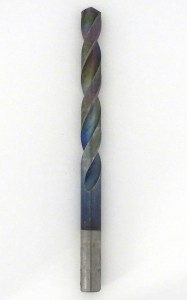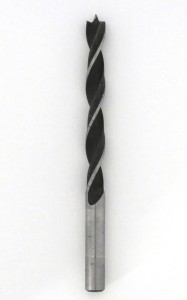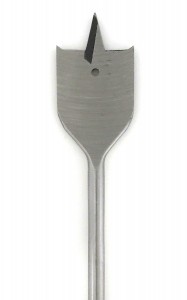Drill bits for wood
Drill bits for wood are essential components of any DIY toolkit, and although there are many different drill bit designs on the market, you only really need three types to deal with the majority of your wood drilling requirements. The guide below details these different types of wood bit, and the situations in which you are most likely to need them.
High speed steel bits

HSS drill bit
High speed steel (HSS) bits are basically your ideal ‘go-to’ bit type, perfectly designed for drilling into wood. An HSS bit is in many ways the classic drill bit design with a fluted shaft coming to a point, and as well as being used to drill into wood, these bits can also be used to drill into metal, and plastics – giving them a multi-purpose aspect.
The steel used in HSS bits is particularly hard, and therefore helps in prolonging drill bit life. Some HSS bits are further hardened with titanium coatings, again, to prolong use.
It’s always good to have a range of sizes of HSS bits, so that you’re prepared for all occasions, but in particular, I make sure I have a good selection of their smaller sized bits (1-3mm), as they’re perfect for drilling small pilot holes.
The bit shown here is a standard steel colour but you’ll also see gold coloured HSS bits.
Brad point drill bits

Brad point drill bit
Brad point drill bits are a particular class of wood drill bits, that I always recommend having in your toolbox.
As shown to the right, they display a slightly different design of spiral shaft compared to standard HSS bits, and they also have a very sharp point at the tip of the bit. This tip basically allows you to be incredibly accurate when starting to drill, and the shaft design helps prevent splintering and creates a very precise straight hole.
I use them for jobs such as cutting holes for wooden dowels, and making pilot holes where pin-point accuracy is essential.Â
To confuse matters slightly, you’ll find HSS brad point wood bits – it just means they’ll be better quality and last longer than softer steel alternatives.
Flat wood bits

Flat, or spade, drill bit
Flat wood bits, or spade bits as they are also called, are the ideal choice when you need to drill larger holes in wood. They can be a little tricky to control, but with practice, accuracy comes.
Standard flat bits are not usually much longer than standard wood bits, but you can also get particularly long shaft options when you need to go into, or through, thick sections of timber.
I always have a good selection at hand for cutting holes in kitchen units, laminate flooring, floorboards, and just about anywhere where a good sized hole may be required.
An alternative to flat bits are auger bits, which are again ideal for cutting larger holes. They are designed for greater accuracy and a cleaner cut, much like brad point bits, but on a larger scale. However, they’re not on my essentials list, as although they are certainly accurate, once you’ve started your hole, you certainly have no chance of any slight adjustment in direction – which is an option that I do find you get from a flat bit.
Other wood bits
When browsing the DIY store aisles, you will come across wood drill bits that look the same as HSS bits, but they will be made of softer steel and therefore can only be used for wood. They’ll wear out quicker than HSS bits, especially when used to drill into hardwoods, so they don’t feature high on my recommendation list.
There are also other drill bits for wood on the market, some being slight variations on those detailed above, and others which are designed for a specific job – a hinge cutter for kitchen unit doors, for example. However, the three wood bit types discussed will deal with the vast majority of DIY wood boring needs. All these bits are suitable for use in cordless drills, and most standard power drills. My ‘How to use a cordless drill’ guide shows exactly how easy these bits are to insert, and use.
